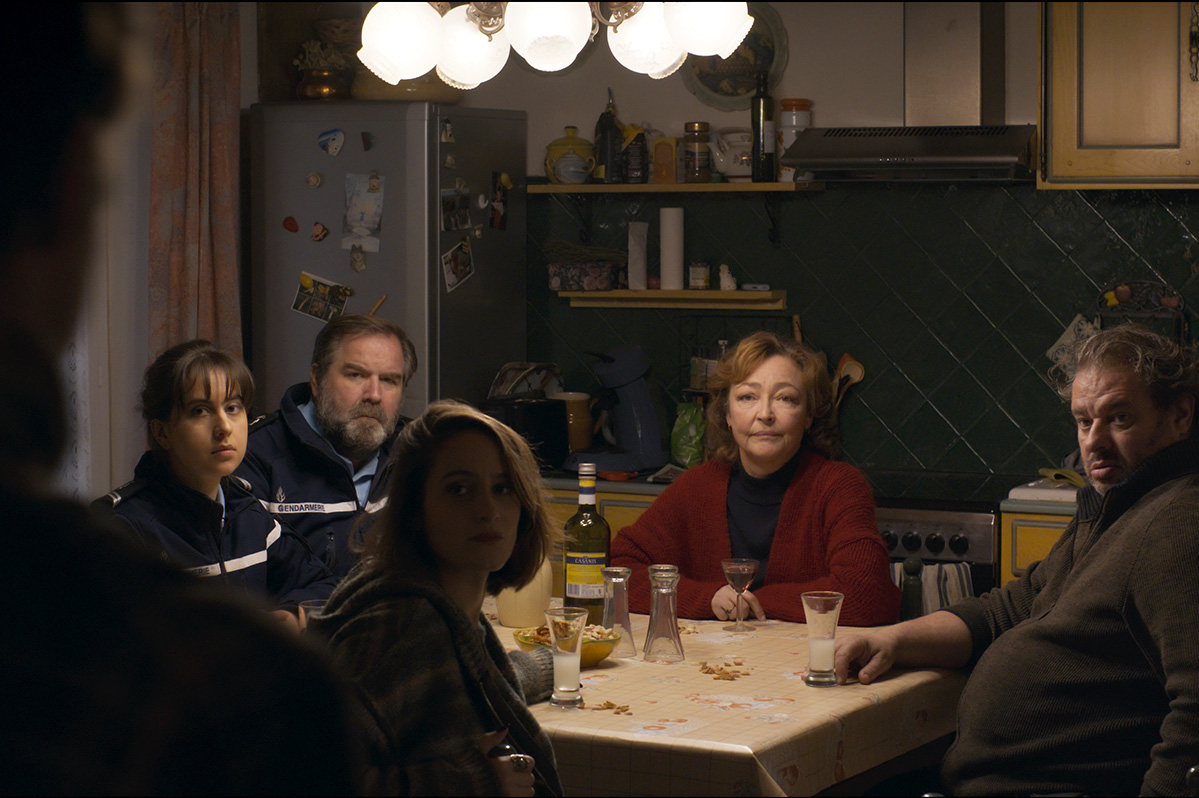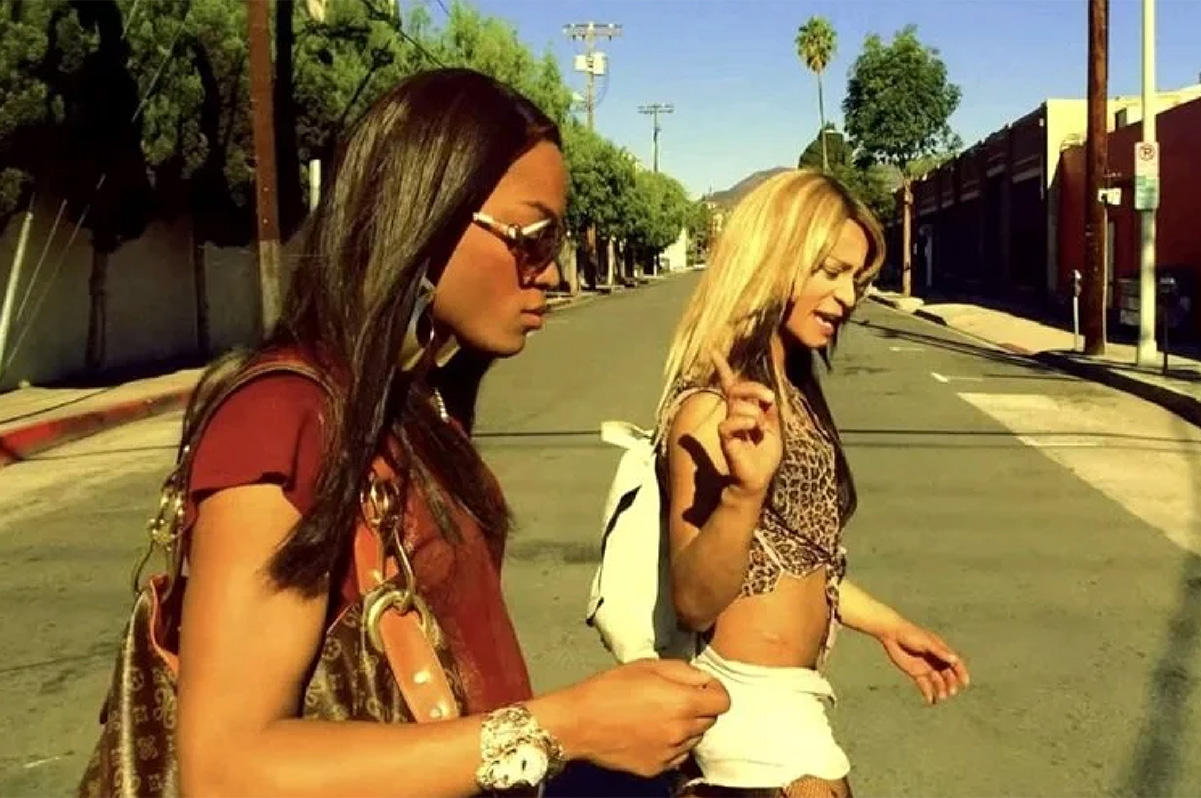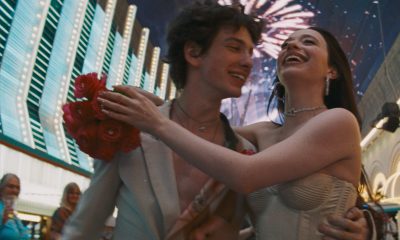Movies
Sexy small town secrets surface in twisty French ‘Misericordia’
A deliciously depraved story with finely orchestrated tension

The name Alain Guiraudie might not be familiar to most Americans, but if you mention “Stranger by the Lake,” fans of great cinema (and especially great queer cinema) are sure to recognize it immediately as the title of the French filmmaker’s most successful work to date.
The 2013 thriller, which earned a place in that year’s “Un Certain Regard” section of the Cannes Film Festival and went on to become an international success, mesmerized audiences with its tense and erotically charged tale of dangerous attraction between two cruisers at a gay beach, one of whom may or may not be a murderer. Taut, mysterious, and transgressively explicit, its Hitchcockian blend of suspense, romance, and provocative psychological exploration made for a dark but irresistibly sexy thrill ride that was a hit with both critics and audiences alike.
In the decade since, he’s continued to create masterful films in Europe, becoming a favorite not only at Cannes but other prestigious international festivals. His movies, each in their own way, have continued to elaborate on similar themes about the intertwined impulses of desire, fear, and violence, and his most recent work – “Misericordia,” which began a national rollout in U.S. theaters last weekend – is no exception; in fact, it draws all the familiar threads together to create something that feels like an answer to the questions he’s been raising throughout his career. To reach it, however, he concocts a story of small town secrets and hidden connections so twisted that it leaves a whole array of other questions in its wake.
It centers on Jérémie (Félix Kysyl), an unemployed baker who returns to the woodsy rustic village where he spent his youth for the funeral of his former boss and mentor. Welcomed into the dead man’s home by his widow, Martine (Catherine Frot), the visitor decides to extend his stay as he reconnects to his old home town and his memories. His lingering presence, however, triggers jealousy and suspicion from her son – and his own former school chum – Vincent (Jean-Baptiste Durand), who fears he has ulterior motives, while his sudden interest in another old acquaintance, Walter (David Ayala), only seems to make matters worse. It doesn’t take long before circumstances erupt into a violent confrontation, enmeshing Jérémie in a convoluted web of danger and deception that somehow seems rooted in the unspoken feelings and hidden relationships of his past.
The hard thing in writing about a movie like “Misericordia” is that there’s really not much one can reveal without spoiling some of its mysteries. To discuss its plot in detail, or even address some of the deeper issues that drive it, is nearly impossible without giving away too much. That’s because it’s a movie that, like “Stranger by the Lake” and much of Guiraudie’s other work, hinges as much on what we don’t know as what we do. Indeed, in its earlier scenes, we are unsure even of the relationships between its characters. We have a sense that Jérémie is perhaps a returning prodigal son, that Vincent might be his brother, or a former lover, or both, and that’s just stating the most obvious ambiguities. Some of these cloudy details are made clear, while others are not, though several implied probabilities emerge with a little skill at reading between the lines; it hardly matters, really, because as the story proceeds, new shocks and surprises come our way which create new mysteries to replace the others – and it’s all on shaky ground to begin with, because despite his status as the film’s de facto protagonist, we are never really sure what Jérémie’s real intentions are, let alone whether they are good or bad.
That’s not sloppy writing, though – it’s carefully crafted design. By keeping so much of the movie’s “backstory” shrouded in loaded silence, Guiraudie – who also wrote the screenplay – reminds us that we can never truly know what is in someone else’s head (or our own, for that matter), underscoring the inevitable risk that comes with any relationship – especially when our passions overcome our better judgment. It’s the same grim theme that was at the dark heart of “Stranger,” given a (slightly) less macabre treatment, perhaps, but nevertheless there to make us ponder just how far we are willing to place ourselves in danger for the sake of getting what – or who – we desire.
As for who desires what in “Misericordia,” that’s often as much of a mystery as everything else in this seemingly sleepy little village. Throughout the film, the sparks that fly between its people often carry mixed signals. Sex and hostility seem locked in an uncertain dance, and it’s as hard for the audience to know which will take the lead as it is for the characters – and if the conflicting tone of the subtext isn’t enough to make one wonder just how sexually adventurous (and fluid) these randy villagers really are beneath their polite and provincial exteriors, the unexpected liaisons that occur along the way should leave no doubt.
Yet for all its murky morality and guilty secrets, and despite its ominous motif of evil lurking behind a wholesome small-town surface, Guiraudie’s pastoral film noir goes beyond all that to find a surprisingly humane layer rising above it all, for which the town’s seemingly omnipresent priest (Jacques Develay) emerges to highlight in the film’s third act – though to reveal more about that (or about him) would be one of those spoilers we like to avoid.
There’s a clue to be found, however, in the film’s very title, which in Catholic tradition refers to the merciful compassion of God for the suffering of humanity, but can be literally translated simply as “mercy.” Though it spends much of its time illuminating the sordid details of private human behavior, and though the journey it takes is often quite harrowing, “Misericordia” has an open heart for all of its broken, stunted, and even toxic characters; Guiraudie treats them not as heroes or villains, but as flawed, confused, and entirely relatable human beings. In the end, we may not know all of their dirty secrets, we feel like we know them – and in knowing them can find a share of that all-forgiving mercy for even the worst of them.
It’s worth mentioning that it’s also a movie with a lot of humor, brimming with comically absurd character moments that somehow remind us of our own foibles even as we laugh at theirs. The cast, led by the opaquely sincere Kysyl and the delicately provocative Frot, forge a perfect ensemble to create the playful-yet-gripping tone of ambiguity – moral, sexual, and otherwise – that’s essential in making Guiraudie’s sly and ultimately wise observations about humanity come across.
And come across they do – but what makes “Misericordia” truly resonate is that they never overshadow its deliciously depraved story, nor dilute the finely orchestrated tension his film maintains to keep your heart pounding as you take it all in.
To tell the truth, we already want to watch it again.
Movies
A Shakespearean tragedy comes to life in exquisite ‘Hamnet’
Chloe Zhao’s devastating movie a touchstone for the ages

For every person who adores Shakespeare, there are probably a dozen more who wonder why.
We get it; his plays and poems, composed in a past when the predominant worldview was built around beliefs and ideologies that now feel as antiquated as the blend of poetry and prose in which he wrote them, can easily feel tied to social mores that are in direct opposition to our own, often reflecting the classist, sexist, and racist patriarchal dogma that continues to plague our world today. Why, then, should we still be so enthralled with him?
The answer to that question might be more eloquently expressed by Chloe Zhao’s “Hamnet” – now in wide release and already a winner in this year’s barely begun awards season – than through any explanation we could offer.
Adapted from the novel by Maggie O’Farrell (who co-wrote the screenplay with Zhao), it focuses its narrative on the relationship between Will Shakespeare (Paul Mescal) and his wife Agnes Hathaway (Jessie Buckley), who meet when the future playwright – working to pay off a debt for his abusive father – is still just a tutor helping the children of well-to-do families learn Latin. Enamored from afar at first sight, he woos his way into her life, and, convincing both of their families to approve the match (after she becomes pregnant with their first child), becomes her husband. More children follow – including Hamnet (Jacobi Jupe), a “surprise” twin boy to their second daughter – but, recognizing Will’s passion for writing and his frustration at being unable to follow it, Agnes encourages him to travel to London in order to immerse himself in his ambitions.
As the years go by, Agnes – aided by her mother-in-law (Emily Watson) and guided by the nature-centric pagan wisdom of her own deceased mother – raises the children while her husband, miles away, builds a successful career as the city’s most popular playwright. But when an outbreak of bubonic plague results in the death of 11-year-old Hamnet in Will’s absence, an emotional wedge is driven between them – especially when Agnes receives word that her husband’s latest play, titled “Hamlet,” an interchangeable equivalent to the name of their dead son, is about to debut on the London stage.
There is nothing, save the bare details of circumstance around the Shakespeare family, that can be called factual about the narrative told in “Hamnet.” Records of Shakespeare’s private life are sparse and short on context, largely limited to civic notations of fact – birth, marriage, and death announcements, legal documents, and other general records – that leave plenty of space in which to speculate about the personal nuance such mundane details might imply. What is known is that the Shakespeares lost their son, probably to plague, and that “Hamlet” – a play dominated by expressions of grief and existential musings about life and death – was written over the course of the next five years. Shakespearean scholars have filled in the blanks, and it’s hard to argue with their assumptions about the influence young Hamnet’s tragic death likely had over the creation of his father’s masterwork. What human being would not be haunted by such an event, and how could any artist could avoid channeling its impact into their work, not just for a time but for forever after?
In their screenplay, O’Farrell and Zhao imagine an Agnes Shakespeare (most records refer to her as “Anne” but her father’s will uses the name “Agnes”) who stands apart from the conventions of her town, born of a “wild woman” in the woods and raised in ancient traditions of mysticism and nature magic before being adopted into her well-off family, who presents a worthy match and an intellectual equal for the brilliantly passionate creator responsible for some of Western Civilization’s most enduring tales. They imagine a courtship that would have defied the customs of the time and a relationship that feels almost modern, grounded in a love and mutual respect that’s a far cry from most popular notions of what a 16th-century marriage might look like. More than that, they imagine that the devastating loss of a child – even in a time when the mortality rate for children was high – might create a rift between two parents who can only process their grief alone. And despite the fact that almost none of what O’Farrell and Zhao present to us can be seen, at best, as anything other than informed speculation, it all feels devastatingly true.
That’s the quality that “Hamnet” shares with the ever-popular Will Shakespeare; though it takes us into a past that feels as alien to us as if it took place upon a different planet, it evokes a connection to the simple experience of being human, which cuts through the differences in context. Just as the kings, heroes, and fools of Shakespeare’s plays express and embody the same emotional experiences that shape our own mundane modern lives, the film’s portrayal of these two real-life people torn apart by personal tragedy speaks directly to our own shared sense of loss – and it does so with an eloquence that, like Shakespeare’s, emerges from the story to make it feel as palpable as if their grief was our own.
Yes, the writing and direction – each bringing a powerfully feminine “voice” to the story – are key to the emotional impact of “Hamnet,” but it’s the performances of its stars that carry it to us. Mescal, once more proving himself a master at embodying the kind of vulnerable masculine tenderness that’s capable of melting our hearts, gives us an accessible Shakespeare, driven perhaps by a spark of genius yet deeply grounded in the tangible humanity that underscores the “everyman” sensibility that informs the man’s plays. But it’s Buckley’s movie, by a wide margin, and her bold, fierce, and deeply affecting performance gives voice to a powerful grief, a cry against the injustice and cruelty of what we fumblingly call “fate” that resonates deep within us and carries our own grief, over losses we’ve had and losses we know are yet to come, along with her on the journey to catharsis.
That’s the word – “catharsis” – that defines why Shakespeare (and by extension, “Hamnet”) still holds such power over the imagination of our human race all these centuries later. The circumstantial details of his stories, wrapped up in ancient ideologies that still haunt our cultural imagination, fall away in the face of the raw expression of humanity to which his characters give voice. When Hamlet asks “to be or not to be?,” he is not an old-world Danish Prince contemplating revenge against a traitor who murdered his father; he is Shakespeare himself, pondering the essential mystery of life and death, and he is us, too.
Likewise, the Agnes Shakespeare of “Hamnet” (masterfully enacted by Buckley) embodies all our own sorrows – past and future, real and imagined – and connects them to the well of human emotion from which we all must drink; it’s more powerful than we expect, and more cleansing than we imagine, and it makes Zhao’s exquisitely devastating movie into a touchstone for the ages.
We can’t presume to speak for Shakespeare, but we are pretty sure he would be pleased.
Movies
‘Hedda’ brings queer visibility to Golden Globes
Tessa Thompson up for Best Actress for new take on Ibsen classic

The 83rd annual Golden Globes awards are set for Sunday (CBS, 8 p.m. EST). One of the many bright spots this awards season is “Hedda,” a unique LGBTQ version of the classic Henrik Ibsen story, “Hedda Gabler,” starring powerhouses Nina Hoss, Tessa Thompson and Imogen Poots. A modern reinterpretation of a timeless story, the film and its cast have already received several nominations this awards season, including a Globes nod for Best Actress for Thompson.
Writer/director Nia DaCosta was fascinated by Ibsen’s play and the enigmatic character of the deeply complex Hedda, who in the original, is stuck in a marriage she doesn’t want, and still is drawn to her former lover, Eilert.
But in DaCosta’s adaptation, there’s a fundamental difference: Eilert is being played by Hoss, and is now named Eileen.
“That name change adds this element of queerness to the story as well,” said DaCosta at a recent Golden Globes press event. “And although some people read the original play as Hedda being queer, which I find interesting, which I didn’t necessarily…it was a side effect in my movie that everyone was queer once I changed Eilert to a woman.”
She added: “But it still, for me, stayed true to the original because I was staying true to all the themes and the feelings and the sort of muckiness that I love so much about the original work.”
Thompson, who is bisexual, enjoyed playing this new version of Hedda, noting that the queer love storyline gave the film “a whole lot of knockoff effects.”
“But I think more than that, I think fundamentally something that it does is give Hedda a real foil. Another woman who’s in the world who’s making very different choices. And I think this is a film that wants to explore that piece more than Ibsen’s.”
DaCosta making it a queer story “made that kind of jump off the page and get under my skin in a way that felt really immediate,” Thompson acknowledged.
“It wants to explore sort of pathways to personhood and gaining sort of agency over one’s life. In the original piece, you have Hedda saying, ‘for once, I want to be in control of a man’s destiny,’” said Thompson.
“And I think in our piece, you see a woman struggling with trying to be in control of her own. And I thought that sort of mind, what is in the original material, but made it just, for me, make sense as a modern woman now.”
It is because of Hedda’s jealousy and envy of Eileen and her new girlfriend (Poots) that we see the character make impulsive moves.
“I think to a modern sensibility, the idea of a woman being quite jealous of another woman and acting out on that is really something that there’s not a lot of patience or grace for that in the world that we live in now,” said Thompson.
“Which I appreciate. But I do think there is something really generative. What I discovered with playing Hedda is, if it’s not left unchecked, there’s something very generative about feelings like envy and jealousy, because they point us in the direction of self. They help us understand the kind of lives that we want to live.”
Hoss actually played Hedda on stage in Berlin for several years previously.
“When I read the script, I was so surprised and mesmerized by what this decision did that there’s an Eileen instead of an Ejlert Lovborg,” said Hoss. “I was so drawn to this woman immediately.”
The deep love that is still there between Hedda and Eileen was immediately evident, as soon as the characters meet onscreen.
“If she is able to have this emotion with Eileen’s eyes, I think she isn’t yet because she doesn’t want to be vulnerable,” said Hoss. “So she doesn’t allow herself to feel that because then she could get hurt. And that’s something Eileen never got through to. So that’s the deep sadness within Eileen that she couldn’t make her feel the love, but at least these two when they meet, you feel like, ‘Oh my God, it’s not yet done with those two.’’’
Onscreen and offscreen, Thompson and Hoss loved working with each other.
“She did such great, strong choices…I looked at her transforming, which was somewhat mesmerizing, and she was really dangerous,” Hoss enthused. “It’s like when she was Hedda, I was a little bit like, but on the other hand, of course, fascinated. And that’s the thing that these humans have that are slightly dangerous. They’re also very fascinating.”
Hoss said that’s what drew Eileen to Hedda.
“I think both women want to change each other, but actually how they are is what attracts them to each other. And they’re very complimentary in that sense. So they would make up a great couple, I would believe. But the way they are right now, they’re just not good for each other. So in a way, that’s what we were talking about. I think we thought, ‘well, the background story must have been something like a chaotic, wonderful, just exploring for the first time, being in love, being out of society, doing something slightly dangerous, hidden, and then not so hidden because they would enter the Bohemian world where it was kind of okay to be queer and to celebrate yourself and to explore it.’”
But up to a certain point, because Eileen started working and was really after, ‘This is what I want to do. I want to publish, I want to become someone in the academic world,’” noted Hoss.
Poots has had her hands full playing Eileen’s love interest as she also starred in the complicated drama, “The Chronology of Water” (based on the memoir by Lydia Yuknavitch and directed by queer actress Kristen Stewart).
“Because the character in ‘Hedda’ is the only person in that triptych of women who’s acting on her impulses, despite the fact she’s incredibly, seemingly fragile, she’s the only one who has the ability to move through cowardice,” Poots acknowledged. “And that’s an interesting thing.”
Movies
The 25 greatest queer movies of the 21st century so far
‘Moonlight,’ ‘Brokeback,’ ‘Carol,’ among highlights

There’s something about a calendar milestone that seems to demand the making of lists.
Whether it’s a list of resolutions for the future or a list of high points for the past, we are happy to oblige – so as we move past the first quarter of our current century, here’s our list of the top 25 queer films since the end of the last one, listed in order of their release, and chosen through a blended consideration of overall critical consensus, cultural impact, and yes, individual tastes.
Our picks might not be the same as yours, because taste is always subjective, so look at this as an invitation to celebrate your favorites by making a list of your own!
Hedwig and the Angry Inch (2001)
John Cameron Mitchell’s screen adaptation of his own genderqueer musical about a third-rate rock singer with a botched sex-change made his jubilantly rebellious off-Broadway hit accessible to uncountable queer audiences – for whom its comically-tortured pseudo-autobiographical tale of empowerment through self-expression felt like “being seen” – and the rest is history.
Mulholland Drive (2001)
Late revered auteur David Lynch’s neo-noir Hollywood mystery – delivered in his famously incomprehensible style – is also a film that strongly centers a same-sex love affair between a naive Hollywood-hopeful actress (Naomi Watts) and the darker, more worldly woman (Laura Herring) with whom she becomes entangled. While their relationship may transmute throughout Lynch’s hallucinatory narrative, it remains the unequivocal emotional core of the film.
Bad Education (2004)
Renowned queer Spanish filmmaker Pedro Almodóvar scored a career high point with this boldly imaginative cinematic melodrama in which a gay film director (Fele Martínez) is reunited with a friend and lover (Gael García Bernal) from boarding school, who has written a script based on the story of their youthful relationship. A breathtaking exploration of a story’s evolution through many retellings – and of cinema’s power to illuminate the human truth behind it.
Brokeback Mountain (2005)
What can we say that hasn’t already been said? Ang Lee’s exquisitely heart-rending adaptation of Anne Proulx’s tale of two cowboys in love smashed open doors for queer storytelling in “mainstream” cinema and perfectly captured the agony of impossible longing that so many people in the rainbow community know all too well. Heath Ledger and Jake Gyllenhaal will forever be the litmus test for true allyship, thanks to their fearless commitment to the validity of a love that simply can’t be “quit.”
Shortbus (2006)
John Cameron Mitchell makes a second appearance on our list for directing this controversial, groundbreaking dramedy featuring intertwined love stories – queer and otherwise – around an underground Manhattan “salon” hosted by Justin Vivian Bond. Featuring explicit scenes of un-simulated sex in a gently satirical commentary on the struggle to connect in a post-millennial world, it pushed boundaries while also validating an open view toward sexuality, relationships, and identity itself.
Pariah (2011)
Dee Rees’s drama about a Black lesbian teen (Adepero Oduye) coming to terms with her identity was a landmark of representation, amplifying both the struggle of queer people facing homophobia from within their own community and the self-empowerment that comes with embracing who you are.
Weekend (2011)
Gay British filmmaker Andrew Haigh made an impressive breakthrough with this romance about two gay Londoners (Tom Cullen and Chris New) who fall in love during a one-night stand, filmed with a mix of scripted structure and improvised performance to capture an eminently relatable queer portrait of the kind of fleeting connection that stays with us for a lifetime.
Stranger by the Lake (2013)
This erotic thriller from French filmmaker Alain Guiraudie channels Hitchcock at his most perverse for its story of a “cruiser” at a nude gay lakeside beach (Pierre Deladonchamps) who becomes infatuated with a man who may or may not be a serial murderer (Christophe Paou). Scary, sexy, and utterly hypnotic, there’s a reason it’s frequently named as one of the best queer horror films of all time.
Carol (2015)
Iconic queer filmmaker Todd Haynes has scored several hits this century, but most impactful of all is his adaptation of Patricia Highsmith’s midcentury lesbian romance between a married woman (Cate Blanchett) and a shopgirl (Rooney Mara), which breaks radical ground by imagining the possibility of a happy ending for queer love in an era that represses it.
Tangerine (2015)
Future “Anora” Oscar-winner Sean Baker made his breakthrough with this gritty, iPhone-filmed dramedy about two trans sex workers on an all-night quest in the streets of Hollywood. Shot on iconic location and boasting the raw authenticity of real-life trans performers Kitana Kiki Rodriguez and Mya Taylor, each of whom knew the “streetlife” of the movie firsthand, it represented a huge advancement in the way trans stories were depicted onscreen while revolutionizing the independent film scene with its DIY audacity.
Moonlight (2016)
Barry Jenkins’ adaptation of Tarell McCraney’s play about a closeted young Black man growing up in the crack-blighted projects of Miami became a landmark of queer cinema by winning the Best Picture Oscar, but its real accomplishment lies in its three-act depiction of coming to terms with queer sexuality in an environment of social disadvantage, entrenched homophobia, and limited opportunity for escape. An unequivocal masterpiece.
BPM (Beats per Minute) (2017)
French filmmaker Robin Campanello crafted this urgently contemporary historical drama about AIDS activism of the 1990s, based on his own real-life experiences as a member of the Parisian chapter of ACT UP, and the result is a thrilling portrait of shared community commitment – and heartbreak – that feels like the most powerful documentary you’ve ever seen.
Call Me by Your Name (2017)

Luca Guadagnino’s coming-of-age romance between a teen boy (an incandescent Timothée Chalamet) and his father’s grad student assistant (Armie Hammer) in Tuscany of the early 1980s may have sparked some controversy over the supposed inappropriateness of the age gap between its onscreen lovers and later revelations about Hammer’s real-life inclinations, but this James Ivory-scripted distillation of the pangs of first queer love transcends all that to become an irresistibly potent masterwork – and touchstone – that gives eloquent voice to both a sense of queer longing and a spirit of pastoral bliss that we all know will always be too good to last.
God’s Own Country (2017)
Often (and perhaps unfairly) characterized as a sort of companion piece to “Brokeback Mountain,” this first directorial effort by UK filmmaker Francis Lee depicts a romance between a young sheep farmer (Josh O’Connor) and the Romanian immigrant worker (Alec Secăreanu) he hires to help him after his father is sidelined by a stroke. In this case, however, the obstacles to their union come from internalized homophobia, not from outside judgments, and the trope of an unhappy ending for queer lovers is – tentatively, at least – rejected for a palpable sense of hope. It’s a small shift, perhaps, but the impact is huge.
The Favourite (2018)
Greek absurdist filmmaker Yorgos Lanthomos won accolades for this historical drama about lesbian power struggles in the 18th-century court of Britain’s Queen Anne (Oscar-winner Olivia Colman), who plays two would-be mistresses (Emma Stone and Rachel Weisz) against each other in a Machiavellian competition for royal favor and the power that goes with it. Consistently appalling and frequently grotesque in its portrait of weaponized proximity to power, it’s as uncomfortably funny as it is radically feminist in its portrayal of forced female enmity in a society still governed by masculine standards, even when a woman holds the dominant position.
Portrait of a Lady on Fire (2018)
This French historical drama from Céline Sciamma might seem at first glance as if it were merely another iteration of the period lesbian romance that has become almost a cliche, but it transcends the tropes to assert a message of feminist rebellion against the male-dominated societal norms – magnified by its 18th century setting – which would dismiss and devalue the inner experience of women, and leaves us all wanting to see “The Patriarchy” burned to the ground.
Neptune Frost (2021)
In this singularly genre-defying musical romance from Saul Williams and Anisia Uzeyman, magical Afrofuturist realism collides with dystopian tech-driven sci-fi for a story of romance between an intersex Burundi refugee (Cheryl Isheja / Elvis Ngabo) and a rebellious coltan miner (Bertrand “Kaya Free” Ninteretse), blending elements of cosmic spirituality with brutally oppressive political reality to create a visually striking modern-day myth, rooted in African tradition and lore, that incorporates the struggle for queer identity into a larger battle against a shadowy over-class that uses technology to force the people into economic slavery. Palpably weird and unrepentantly radical, it speaks – and sings – truth to power in a way that most modern films could simply never imagine.
Everything Everywhere All at Once (2022)
This multi-Oscar-winning surprise hit from the filmmaking team known collectively as “The Daniels” (Kwan and Schwienert are their real-life surnames) might be a brilliantly absurdist action comedy about a war for the fate of the multiverse, but it’s built around the struggle of an Asian-American mother (Michelle Yeoh) to reconcile her strained relationship with her queer daughter (Stephanie Hsu) and come to terms with her disillusionment over her devoted but seemingly incompetent husband (Ke Huy Quan) – all while negotiating her tax returns with a no-nonsense IRS agent (Jamie Lee Curtis) who may have been her lesbian lover in another reality. It might take a collective effort from dozens of alternative timelines, but the fight is definitely worth it, in the end.
Fire Island (2022)
Director Andrew Ahn teamed with writer/star Joel Kim Booster for this modernized gay adaptation of “Pride and Prejudice” in which Jane Austen’s 19th-century social commentary is reframed in the world of queer culture, highlighting the class differences between economic and social status, and amplifying the experience of Asian-American males in the white-centric queer heirarchy of the contemporary age. It sounds like a stretch, but it’s a more authentically heartfelt – and unapologetically intelligent – queer romcom than the much-touted “Bros,” which debuted the same year to a dishearteningly meager box office take.
Tar (2022)
Acclaimed Kubrick protege Mike Field’s third movie is this ethically challenging drama starring Cate Blanchett as a renowned lesbian conductor targeted by “cancel culture” over her history of predatory sexual misconduct. An alternately bemusing and horrifying portrait of toxic behavior and a culture more interested in passing judgment than addressing inequities, it’s an uncompromisingly detached cautionary tale about female power in a world still governed by patriarchal standards, with Blanchett’s flawless performance as the glue that holds it all together.
All of Us Strangers (2023) Andrew Haigh makes a second appearance on our list as writer/director of this haunting adaptation of a novel by Japanese author Taichi Yamada, in which a lonely screenwriter (Andrew Scott) revisits his childhood home to commune with his long-dead parents (Jamie Bell, Claire Foy) while navigating a tentative new relationship with a melancholy neighbor (Paul Mescal) in his strangely deserted apartment building. Part ghost story, part melancholy romance, and all about the exploration of queer isolation and lingering childhood trauma, it adds up to an unexpectedly uplifting meditation on love with supernatural overtones that render it into the stuff of mystical poetry. An essential queer classic, right out of the box.
I Saw the TV Glow (2024)
As queer cinema continues to struggle with the challenge of bringing trans stories to the big screen in the face of political pushback from transphobic culture warriors, filmmaker Jane Schoenbrun has bravely pushed forward, and this – her second feature – achieves full-on cinematic greatness, delivering a trans allegory in the shape of a disquieting horror movie about former teen schoolmates (Justice Smith and Jack Haven) haunted by phantom memories of a favorite TV show from their past. Capped with a final sequence that drives home the despair of living a life of pretense against your own inner truth, it’s a surreal and devastatingly immediate fantasia on themes of gender, sexuality, and conformity, but also an indictment against the outright erasure of trans identity in a world that would rather pretend it never existed in the first place.
Love Lies Bleeding (2024)
Rose Glass’s lesbian neo-noir thriller teams queer icon Kristen Stewart with Katy O’Brien for a twisted love story between the daughter of a small-town crime boss and a steroid-addled aspiring female bodybuilder which leads them both down a harrowing road of violence and terrible choices yet keeps us pulling for their union every step of the way. A slice of deliberate B-movie exploitation cinema at its most elevated, it embraces its generic camp to take us on a deliciously unpredictable wild ride fueled by a deeply satisfying spirit of queer feminist rebellion.
The Visitor (2024)
Underground filmmaker and “queercore” pioneer Bruce La Bruce has a long history of creating brilliant countercultural cinema underneath the mainstream radar, but he finds his way onto our list via his audacious remake of Pier Paolo Pasolini’s “Terorema,” in which a mysterious and sexually fluid stranger destroys a dissolute bourgeois household from within by seducing each of them – from father and mother to son, daughter, and maid – in turn. Reset into contemporary England and informed by a xenophobic fear of the “other,” it doubles down on Pasolini’s socio-political statement while upping the ante with transgressive scenes of un-simulated sex. The result is an artfully campy, frequently absurd, and completely unforgettable excursion into radical queer expression that fearlessly exposes the hypocrisies of so-called “straight” society while fostering an “eat the rich” attitude of sexual rebellion that has yet to be matched by any filmmaker working within “the system.”
The History of Sound (2025)
South African filmmaker Oliver Hermanus has made a number of passionate queer films during his career, but this WWI-era romantic drama about two music scholars (Paul Mescal and Josh O’Connor), who fall in love while gathering folk songs in rural New England, surpasses his earlier triumphs by offering up a bittersweet-but-transcendent meditation on the power of music to carry the memories of shared struggle and hardship forward through each new generation, as humans – queer or otherwise – strive to find happiness in the proscribed limitations of their lives. Yes, it’s tragic; but thanks to the exceptional tenderness between its two stars and the compassionate treatment which Hermanus extends to their star-crossed characters, it leaves us with the memory of the good things while offering hope for a future that gives us – at long last – the freedom to be who we are.




















